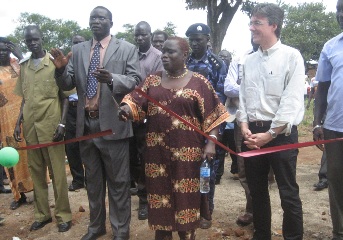Sudan’s referendum without food security is meaningless – Itto
By Julius N. Uma
September 7, 2010 (MOROBO) – As Southern Sudan prepares for conduct of a referendum on self-determination, a senior government official has warned that success in favor of either unity or separation will be meaningless unless the need to achieve food security is handled with seriousness.

The team, which included Joachim von Amsberg, the World Bank Vice President for Operations Policy and Country Services (OPCS) and Lise Grande, the UN Deputy Resident Coordinator for Humanitarian Affairs, visited Yei County-based Crop Training Center. They also visited two Food Crisis Response Projects funded by the Bank in Morobo under the emergency food crisis response.
The three-year project, earmarked to the tune of $85 million is currently being implemented by Action Africa Help (AAH) in Morobo and Yambio, Western Equatoria state capital.
“Much as we talk about success in the forthcoming referendum either in favor of separation or unity, let’s not ignore aspects of food security for our people. For a democratic government to function properly, food security remains an essential element,” Dr. Itto said.
An estimated nearly 80 percent of the population in the semi-autonomous region still depends on agriculture, which currently forms the main source of livelihood in rural settings.
The government, the Minister noted, had embarked on an 18-month agricultural programme aimed at increasing productivity, through provision of improved seed varieties, infrastructural development and emphasis on modern farming techniques as opposed to use of rudimentary equipments.
“We need to change the current dependency syndrome of over relying on food imported from neighboring Uganda, Kenya and others. The government remains committed towards reversing these trends for the benefit of our people,” Dr. Itto, also SPLM Deputy Secretary General for Southern Sector.
According to the Agriculture Minister, increasing agricultural productivity will further involve taking consideration the amount in metric tons of food produced by each household actively in agricultural activities.
“During the war, each household used to produce about 7.8 metric tons of food. After the war, this has dropped to just 1.5 metric tons per household involved in agriculture,” she said, adding that, “We need more youth involvement in agricultural activities”.
On his part, Amsberg, lauded the southern government for its positive post-war recovery progress, but said more emphasis should be put on developing skills that will improve the agricultural sector.
“The World Bank can be helpful in supporting development initiatives that focuses on skills development and community empowerment. There must also be government support through creating a stable political environment,” the World Bank OPCS Vice President said.
Another World Bank-funded project, estimated at $42.29 million is currently being implemented by the Norwegian Peoples Aid (NPA) to support agricultural and forestry development in the 5 states of Jonglei, Upper Nile, Central Equatoria, Eastern Equatoria and Unity.
Southern Sudan, despite its current dependency on food produced from the neighboring countries, has promising production in its arable agricultural land, which has not yet been utilized due to factors of insecurity and lack of sufficient funding in this field.
(ST)
